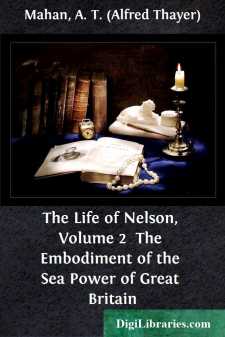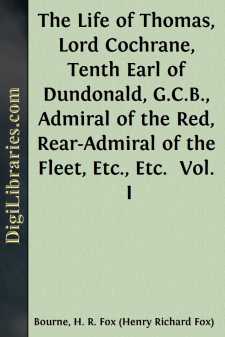Biography & Autobiography
- Adventurers & Explorers 15
- Artists, Architects, Photographers 16
- Business 2
- Composers & Musicians 14
- Criminals & Outlaws 5
- Editors, Journalists, Publishers 6
- Educators 1
- Entertainment & Performing Arts 3
- General 73
- Health, Exercise & Fitness 1
- Historians 3
- Historical 83
- Law Enforcement 1
- Lawyers & Judges 3
- Literary 147
- Medical 7
- Military
- Naturalists, Gardeners, Environmentalists 8
- Personal Memoirs & Diaries 226
- Philosophers 3
- Political 9
- Presidents & Heads of State 38
- Religious 38
- Rich & Famous 27
- Scientists 13
- Women 31
Military Books
Sort by:
CHAPTER XIV. NELSON TEMPORARILY COMMANDER-IN-CHIEF IN THE MEDITERRANEAN.—RELIEVED BY LORD KEITH.—APPLIES TO RETURN TO ENGLAND ON ACCOUNT OF ILL HEALTH. AUGUST, August 1799—JUNE, 1800. AGE, 41. Upon Keith's departure, the command in the Mediterranean devolved upon Nelson, who for some time remained in doubt of the fact, but with his usual promptitude acted as if all depended upon himself....
more...
by:
James Harrison
PREFACE. There are few works, the authors of which can possibly be permitted to recommend them as worthy of universal regard, without the imputation of intolerable vanity; an imputation little likely to be diminished by the consideration, that other writers, over whom a decided preference is claimed, may have previously occupied the same subject. A Life of Lord Nelson, however, replete with original...
more...
by:
James Harrison
THE LIFE OF LORD NELSON,DUKE OF BRONTE, &c. In tracing the history of a hero so active as Lord Nelson, the mind can scarcely be allowed a moment's pause. His multifarious transactions, indeed, frequently arise in such rapid successions, that they become far too much involved with each other to admit of any precise chronological arrangement. Operations are commenced, which cannot always be...
more...
THE DIFFERENT DEGREES OF SPIES. Let us for the moment change the term "spy" to "investigator" or "military agent." For war purposes these agents may be divided into: 1. Strategical and diplomatic agents, who study the political and military conditions in peace time of all other countries which might eventually be in opposition to their own in war. These also create political...
more...
by:
William Beatty
Narrative Lord NELSON sailed from St. Helen's in the Victory, with the Euryalus frigate, on the morning of the 15th of September 1805, to take the command of the British Fleet cruizing before Cadiz. On the 18th he appeared off Plymouth; where he was joined by his Majesty's ships Thunderer and Ajax, with which he proceeded for his destined station. On the 20th he communicated by private signal...
more...
LORD COCHRANE'S ARRIVAL IN GREECE.—HIS ACCOUNT OF HYDRA AND POROS.—THE CONGRATULATIONS OFFERED TO HIM.—VISITS FROM TOMBAZES, MAVROCORDATOS, AND MIAOULIS.—LETTERS FROM THE NATIONAL ASSEMBLY AND OTHER PUBLIC BODIES AND LEADING MEN.—THE DIVISIONS IN GREECE.—THE FRENCH OR MOREOT, AND ENGLISH OR PHANARIOT FACTIONS.—LORD COCHRANE'S RELATIONS WITH THEM.—THE VISIT OF KOLOKOTRONES AND...
more...
CHAPTER I. INTRODUCTION.—LORD COCHRANE'S ANCESTRY.—HIS FIRST OCCUPATIONS IN THE NAVY.—HIS CRUISE IN THE "SPEEDY" AND CAPTURE OF THE "GAMO."—HIS EXPLOITS IN THE "PALLAS."—THE BEGINNING OF HIS PARLIAMENTARY LIFE.—HIS TWO ELECTIONS AS MEMBER FOR HONITON.—HIS ELECTION FOR WESTMINSTER.—FURTHER SEAMANSHIP.—THE BASQUE ROADS AFFAIR.—THE COURT-MARTIAL ON LORD...
more...
by:
Cecil Chisholm
INTRODUCTION BY FIELD-MARSHAL SIR EVELYN WOOD, V.C. I regard John Denton French as the man who for the last twelve years has been the driving force of tactical instruction in the British Army. He made use of all the best ideas of the Generals who preceded him in the Aldershot Command, and he was, I think, instrumental in causing the appointment of Horace Smith-Dorrien and Douglas Haig to succeed in...
more...
CHAPTER I Parentage and Early Life—Appointment to West Point—Virginian Room- Mates—Acquaintance with General Winfield Scott—Character of the West Point Training—Importance of Learning how to Obey—A trip to New York on a Wager—The West Point Bible-class—Dismissed from the Academy Without Trial—Intercession of Stephen A. Douglas— Restoration to Cadet Duty—James B. McPherson—John...
more...
by:
John Marshall
CHAPTER I. Greene invests Camden.... Battle of Hobkirk's Hill.... Progress of Marion and Lee.... Lord Rawdon retires into the lower country.... Greene invests Ninety Six.... Is repulsed.... Retires from that place.... Active movements of the two armies.... After a short repose they resume active operations.... Battle of Eutaw.... The British army retires towards Charleston. 1781In South Carolina...
more...











